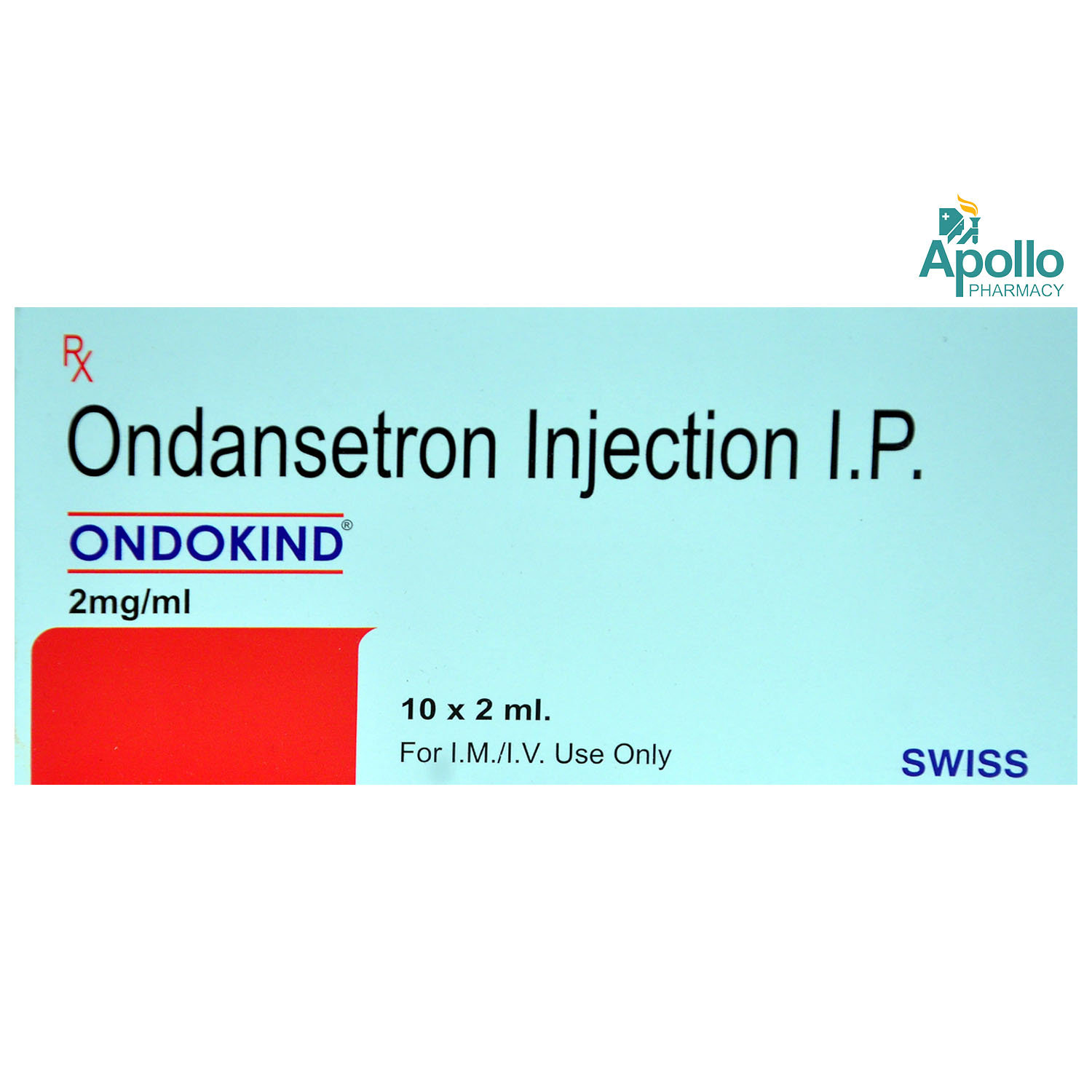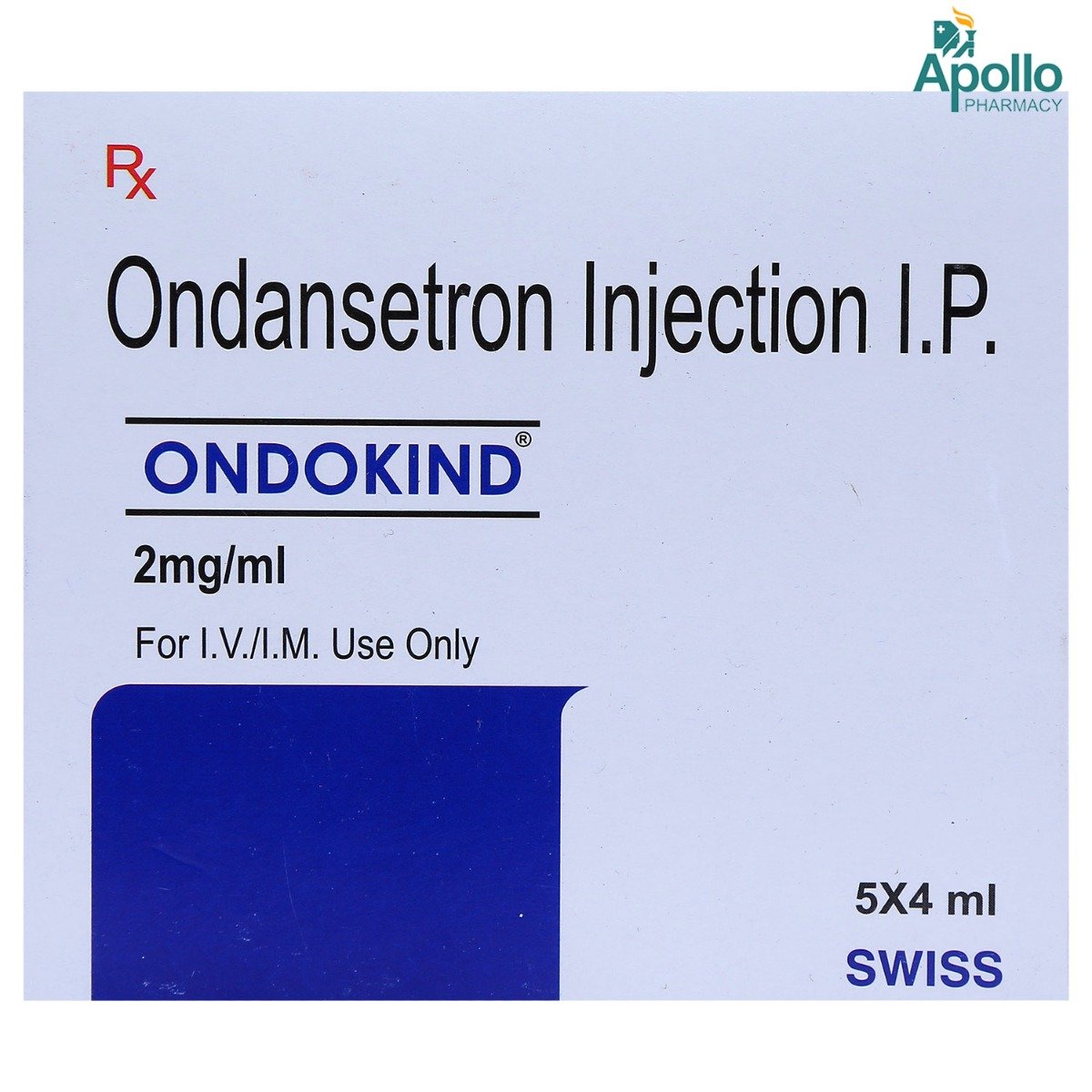Ondansetron
About Ondansetron
Ondansetron belongs to a group of medications called ' antiemetics,' primarily used in the prevention of vomiting (being sick) and nausea (feeling sick) that usually occur after cancer chemotherapy, radiation treatment, or surgery. Nausea is an uneasy feeling in which a person feels an urge to vomit, while vomiting is the natural response of the body to expel the stomach contents from the mouth forcefully.
Ondansetron contains Ondanestron, which works by blocking the action of a chemical in the body (serotonin) responsible for causing nausea and vomiting. As a result, Ondansetron prevents the sensation of nausea and vomiting caused by conditions like surgery, cancer chemotherapy, pregnancy, or motion sickness.
Take Ondansetron exactly as prescribed. Your doctor will advise you on how often you take Ondansetron based on your medical condition. You may experience common side effects such as constipation, headache, diarrhea, drowsiness, flushing (a feeling of warmth), weakness, and tiredness. However, not every person experiences these side effects, and some of the unpleasant effects of Ondansetron do not require medical attention. If the side effects persist or worsen, please consult your doctor.
Before using Ondansetron, inform your doctor if you are allergic to any of its ingredients. Do not use Ondansetron if you are taking apomorphine (a medicine used to treat Parkinson's disease), as it may cause a sharp drop in blood pressure and even fainting. Inform your doctor before using Ondansetron if you have any medical conditions, such as severe constipation, bowel obstruction, depression, electrolyte imbalance, irregular heartbeat, liver problems, or a history of tonsils or adenoid removal surgery. Ondansetron should be used during pregnancy and breastfeeding only if prescribed by a doctor.
Uses of Ondansetron
Medicinal Benefits
Ondansetron is an antiemetic medication primarily used to prevent and treat nausea and vomiting associated with conditions such as cancer chemotherapy, radiation treatment, and surgery. When serotonin levels increase in the blood, it stimulates the CTZ receptor (chemoreceptor trigger zone) located in the brain, which is responsible for controlling nausea and vomiting. Ondansetron contains Ondansetron, which works by inhibiting the release of serotonin, thereby preventing nausea and vomiting.
Directions for Use
- Ondansetron can be taken with or without food, as advised by the doctor.
- Follow your doctor's instructions on the dosage and timing of this medication.
- Place Ondansetron on your tongue and allow it to dissolve before swallowing.
- Do not swallow Ondansetron as a whole.
- Make sure your hands are dry before handling Ondansetron.
Storage
Side Effects of Ondansetron
- Constipation
- Headache
- Diarrhoea
- Drowsiness
- Flushing (a feeling of warmth)
- Weakness
- Tiredness
Drug Warnings
Do not use Ondansetron if you are allergic to any of its ingredients. Avoid using Ondansetron if you are taking apomorphine (a medicine used to treat Parkinson's disease), as it may cause a sharp drop in blood pressure and even fainting. Inform your doctor before using Ondansetron if you have any medical conditions, such as severe constipation, bowel obstruction, depression, electrolyte imbalance, heart or blood vessel problems (such as irregular heartbeats and high blood pressure), diabetes, liver problems, or a history of tonsils or adenoid removal surgery. Tell your doctor if you are taking any medications for depression, as using them alongside Ondansetron may increase the risk of serotonin syndrome, a potentially life-threatening condition. Ondansetron is not recommended for use during early pregnancy (first trimester), as it may increase the risk of birth defects in the mouth and face of the baby. Avoid breastfeeding while taking Ondansetron, as small amounts of the medicine may pass into breast milk. Avoid consuming alcohol while taking Ondansetron, as it may worsen the side effects like drowsiness.
Drug Interactions
Drug-Drug Interaction: Ondansetron may interact with certain medications, such as anti-parkinsonian medicines (apomorphine), anti-seizure drugs (phenytoin, carbamazepine), antibiotics (rifampicin, erythromycin), antifungals (ketoconazole), medications that can affect the heart (methadone, haloperidol), anticancer drugs (trastuzumab), antidepressants (paroxetine, sertraline, fluoxetine, citalopram, duloxetine, venlafaxine), and painkillers (acetaminophen, tramadol, ibuprofen).
Drug-Food Interaction: No interactions were found/established.
Drug-Disease Interaction: Ondansetron should be used with caution in certain medical conditions, such as severe constipation, bowel obstruction, depression, electrolyte imbalance, heart or blood vessel problems (such as irregular heartbeats and high blood pressure), diabetes, liver problems, or a history of tonsils or adenoid removal surgery.
Drug-Drug Interactions Checker List:
Safety Advice
Alcohol
cautionAlcohol has no known direct interaction with Ondansetron. However, it is advisable to avoid consuming alcohol while taking Ondansetron, as it may worsen the side effects like drowsiness.
Pregnancy
cautionOndansetron should be used during pregnancy only if prescribed by a doctor. It is generally not recommended for use during early pregnancy (first trimester), as it may increase the risk of birth defects in the mouth and face of the baby.
Breast Feeding
cautionAvoid breastfeeding while taking Ondansetron, as small amounts of the medicine may pass into breast milk.
Driving
cautionOndansetron does not affect your ability to drive. However, if you experience drowsiness or blurred vision after taking Ondansetron, avoid driving or operating any heavy machinery.
Liver
cautionIn individuals with liver problems, the use of Ondansetron is allowed if prescribed by a doctor. However, patients with severe liver impairment should take a low dose of Ondansetron as much as possible. Do not take more than 8 mg of Ondansetron per day in case of liver disease.
Kidney
safe if prescribedThe use of Ondansetron is considered safe in patients with kidney disorders. No dose adjustment is required.
Children
safe if prescribedOndansetron should not be given to children below 4 years of age, as its safety and effectiveness have not been established in this age group. The use of Ondansetron is safe in children above 4 years of age if prescribed by a doctor.
Habit Forming
Diet & Lifestyle Advise
- Eat small meals throughout the day and eat slowly to help digestion.
- If you are sensitive to food smells, try eating cold or room-temperature foods instead of hot ones.
- Avoid acidic foods or drinks like orange or grapefruit juice.
- After your meals, rest with your head elevated about 12 inches above your head.
- Drink liquids or water between meals rather than during meals.
- Eat when you are least nauseated to help prevent discomfort.
- Avoid consuming greasy or oily foods, as these foods can trigger nausea and vomiting.
- Include clear broths, non-fat yoghurt, fruit juice, sherbet, and sports drinks for fluid makeup that has been lost due to vomiting.
Special Advise
- Regularly monitor your serum electrolytes (such as magnesium or potassium levels in the blood) while taking Ondansetron.
- Ondansetron may contain phenylalanine, so if you have Phenylketonuria (too much of the protein phenylalanine in the blood), avoid its intake.
Patients Concern
Disease/Condition Glossary
Nausea and Vomiting: Nausea is an uneasy feeling in the stomach that may come and go in waves, often accompanied by a strong urge to vomit. It typically happens before vomiting. Vomiting, on the other hand, is the body's natural response where stomach contents are forcefully expelled through the mouth. It can be triggered by taste, anxiety, smell, pain, or irritation of the stomach. Usually, a person experiences nausea and vomiting as the unpleasant side effects of cancer chemotherapy and radiation therapy. It is essential to manage vomiting and nausea in cancer patients for performing their everyday activities. If left uncontrolled, it can lead to mental changes, loss of appetite, malnutrition, and dehydration.
FAQs
Ondansetron is an antiemetic medication primarily used to prevent and treat nausea and vomiting associated with conditions such as cancer chemotherapy, radiation treatment, and surgery.
Ondansetron contains Ondansetron (an antiemetic) that works by blocking the action of a chemical (serotonin) in the body that triggers nausea and vomiting. As a result, Ondansetron helps prevent the sensation of nausea and vomiting.
The common side effects of Ondansetron may include constipation, headache, diarrhoea, drowsiness, flushing (a feeling of warmth), weakness, and tiredness. However, not every person experiences these side effects, and some of the unpleasant effects of Ondansetron do not require medical attention. If the side effects persist or worsen, please consult your doctor.
You should not use Ondansetron if you are allergic to any of its ingredients. Also, avoid using Ondansetron if you are taking apomorphine (a medicine used to treat Parkinson's disease), as it may cause a sharp drop in blood pressure and even fainting.
Ondansetron is an anti-emetic oral medication that rapidly dissolves in your mouth and works within a few seconds.
Always use Ondansetron exactly as instructed by your doctor. Check Ondansetron for any damage and use only undamaged strips/films. Make sure your fingers are dry and your mouth is empty before putting the strip/film on your tongue. The strip/film should melt on your tongue in a few seconds without using saliva or needing water, and it can then be swallowed.
Ondansetron should be used during pregnancy only if prescribed by a doctor. It is generally not recommended for use during early pregnancy (first trimester), as it may increase the risk of birth defects in the mouth and face of the baby.






